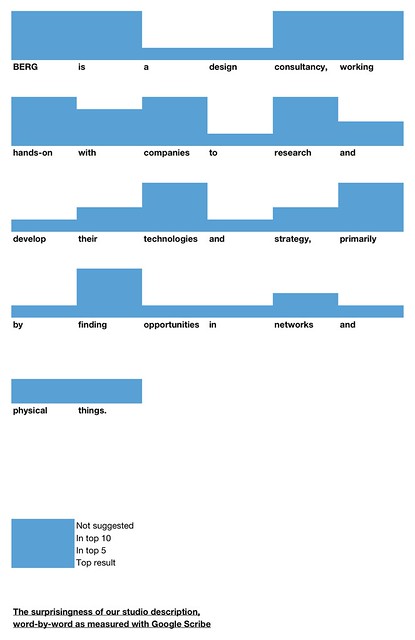Google Scribe is autocomplete meets word processing. It looks at everything you’ve typed so far, and predicts what you’re going to say next. For example, Scribe believes I am now about to write: they are not the only one who can not afford to pay for the cost of the project is to develop a new generation of protein database.
I feel like I’m connected to the spirit world, except that the spirit world is an amalgam of a billion Internet users and Google’s massive server farm.
What I like about Scribe is that you can see how surprising each word is. If Google can’t predict what you’re about to say, what you’re saying is truly novel.
So:
At the bottom of every page on this website, there’s a little statement about ourselves: BERG is a design consultancy, working hands-on with companies to research and develop their technologies and strategy, primarily by finding opportunities in networks and physical things.
I made a chart of word-by-word surprisingness: given the statement so far, could Scribe predict what would come next?
Here are the results:
I learn that about half of the statement is exactly what Google’s spirit world expects, which goes to show it could be more concise and higher signal-to-noise.
Use this technique to avoid redundancy in speech or writing.

7 Comments and Trackbacks
1. Eponymous Coward said on 8 September 2010...
Fits with lots of things this:
1. The advice to avoid cliches
2. The stuff from linguistics about the way the brain stores ‘phrasal lexemes’ which require less brain-processing power than totallly novel phrases so we default to them…
3. The philosophical stuff about most language being dead metaphor (with the implicit encouragement to go for the live stuff)
BUT
In some cases though it’s not so much signal-to-noise as signal to scaffolding. Totally surprising sentences might be denser in terms of ideas-per-square-inch but not necessarily as effective at communicating. Wonder what you’d get if you ran some famous speeches through this treatment?
2. Jimmy Tidey said on 9 September 2010...
Improvements to concision are welcome, but doesn’t everyone dread the day when a computer can parse your writing and rephrase it better than you ever could have done?
Fortunately, it might not happen. This chap:
http://www.comlab.ox.ac.uk/people/Stephen.Pulman/
pointed out on Radio 4 that exciting writing breaks the rules – whatever they are. Regardless of perfection, an algorithm for improving written communication will always be surpassed by someone subverting, rejecting or warping the standards it imposes for stylistic effect.
Perhaps when computers are very much intelligent things will be different – but I suspect Google has a way to go before coming close to how people think about words.
3. Tom Coates said on 9 September 2010...
It shows you redundancy, yes, but it surely also shows you plausible truth as well. For example. You could easily write “The sun is shining” and it would predict it accurately, but it’s still a useful statement under certain circumstances. Finding something that it didn’t predict would probably mean it wasn’t a valid thing to say about the sun, for example “The sun is evil” or “The sun is not the sun”. Novelty is clearly not the only criteria, here. Still, lovely visualisation and nice thought experiment.
4. Austen said on 12 September 2010...
An interesting tool, but novelty is just one of many virtues we ought to care about in writing. That one blues song reminds us other blues songs just means there’s a genre being respected and adhered to. After a 12-bar phrase we WANT it to cycle back to the root. Similarly, that the word “by” is predicted after “The book was written” is not a flaw. It just means the writer is using proper English grammar. Fluid communication depends on a certain amount of NON-novelty.
5. kumar said on 2 December 2010...
o think,
In a world where we do not have time to do-even to think-whatever we must to reach at least a %of our set goals,tools will be highly useful provided their interfaces are acceptably Spartan and intuitive. Google has done remarkably well down this road and i hope they will proceed with their experiments. Your article was very eye opening.Thanks webb!
Trackback: Things I read on 8th September 2010 | I’m George’s Blog 8 September 2010
[…] The surprisingness of what we say about ourselves · · · ◊ ◊ ◊ · · · Leave a Reply Click here to cancel reply. […]
Trackback: The surprisingness of what we say about ourselves – Blog – BERG | Venite 10 September 2010
[…] is. If Google can’t predict what you’re about to say, what you’re saying is truly novel. via The surprisingness of what we say about ourselves – Blog – BERG featured in O’Reilly Radar‘s “Four Short […]